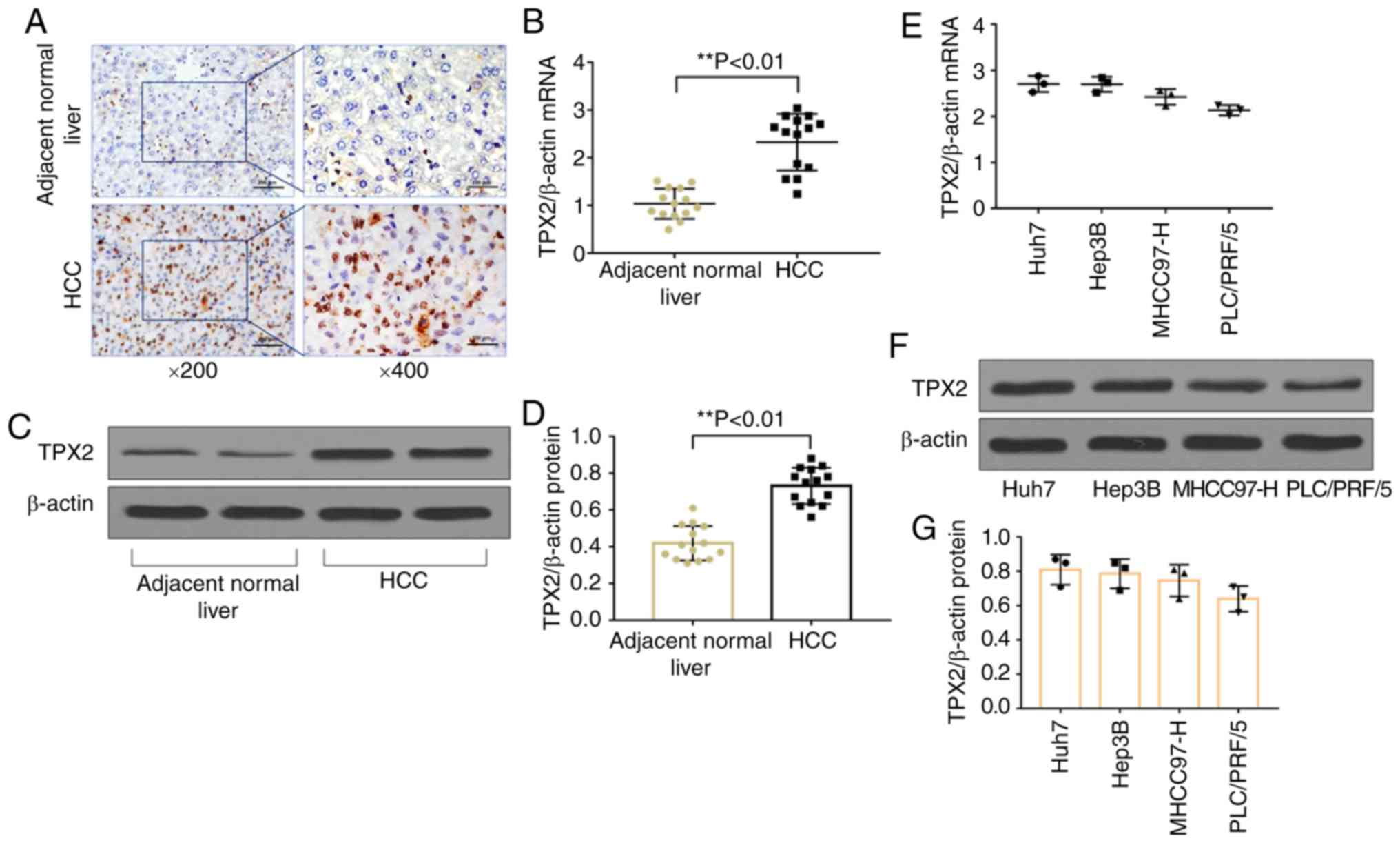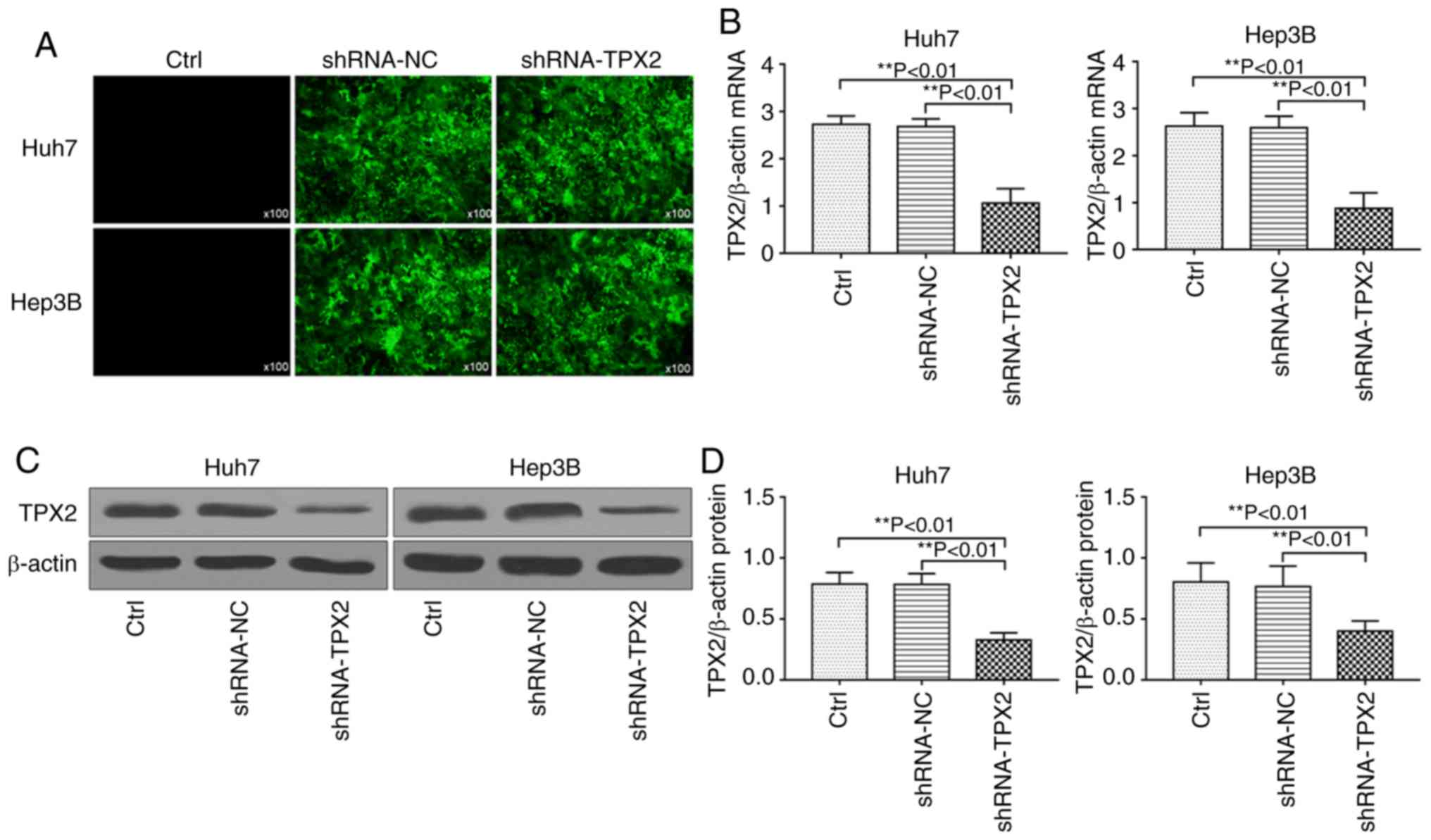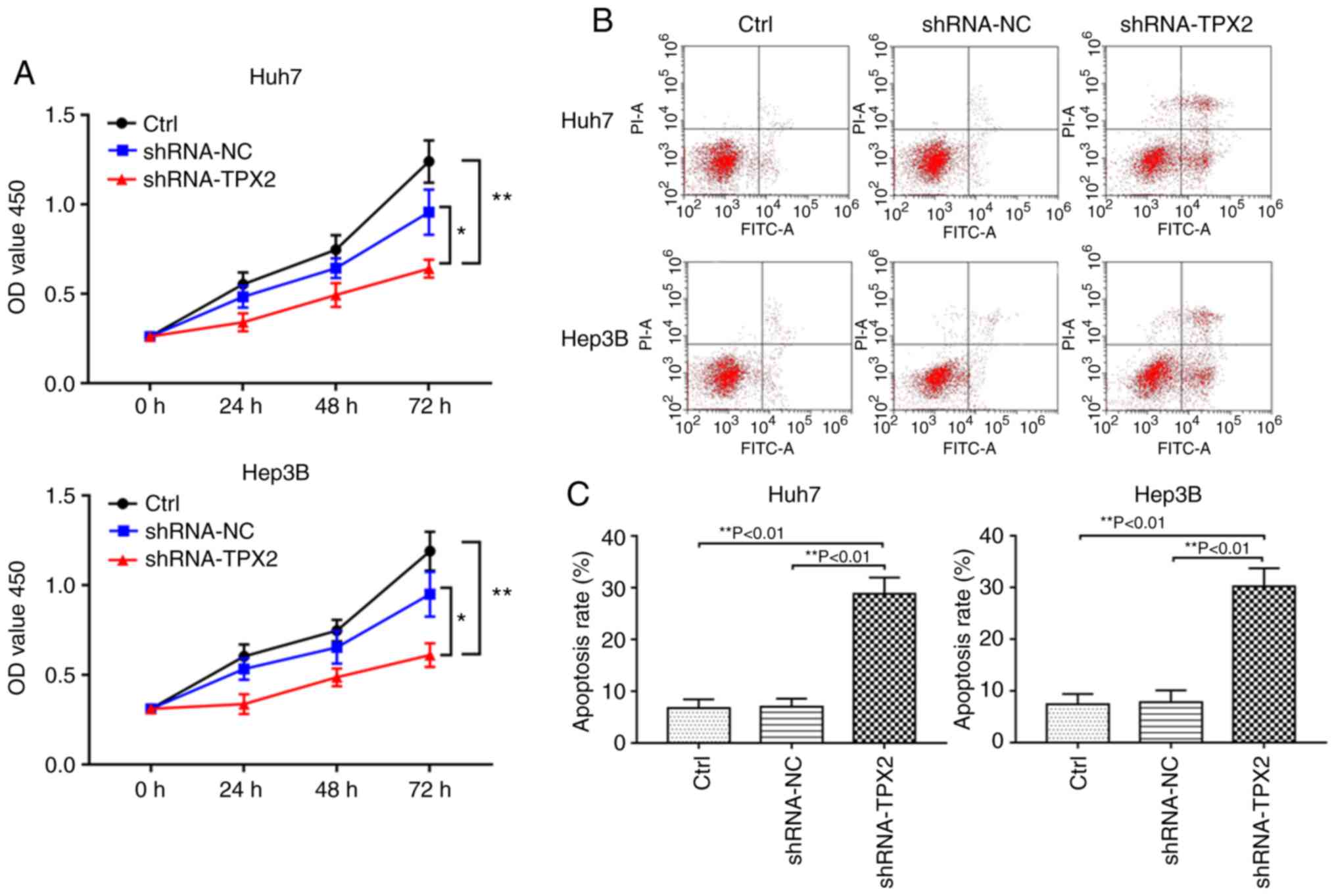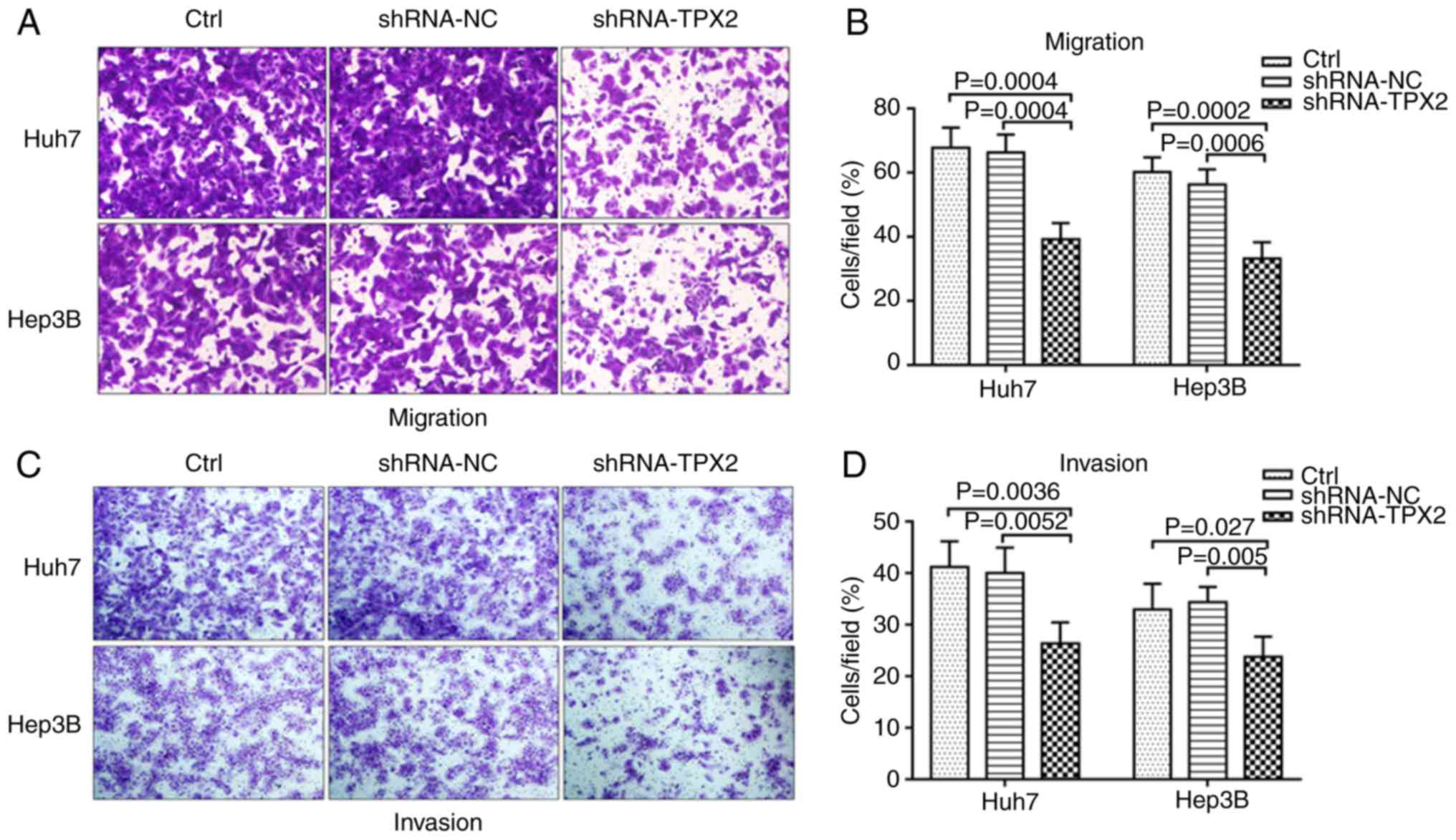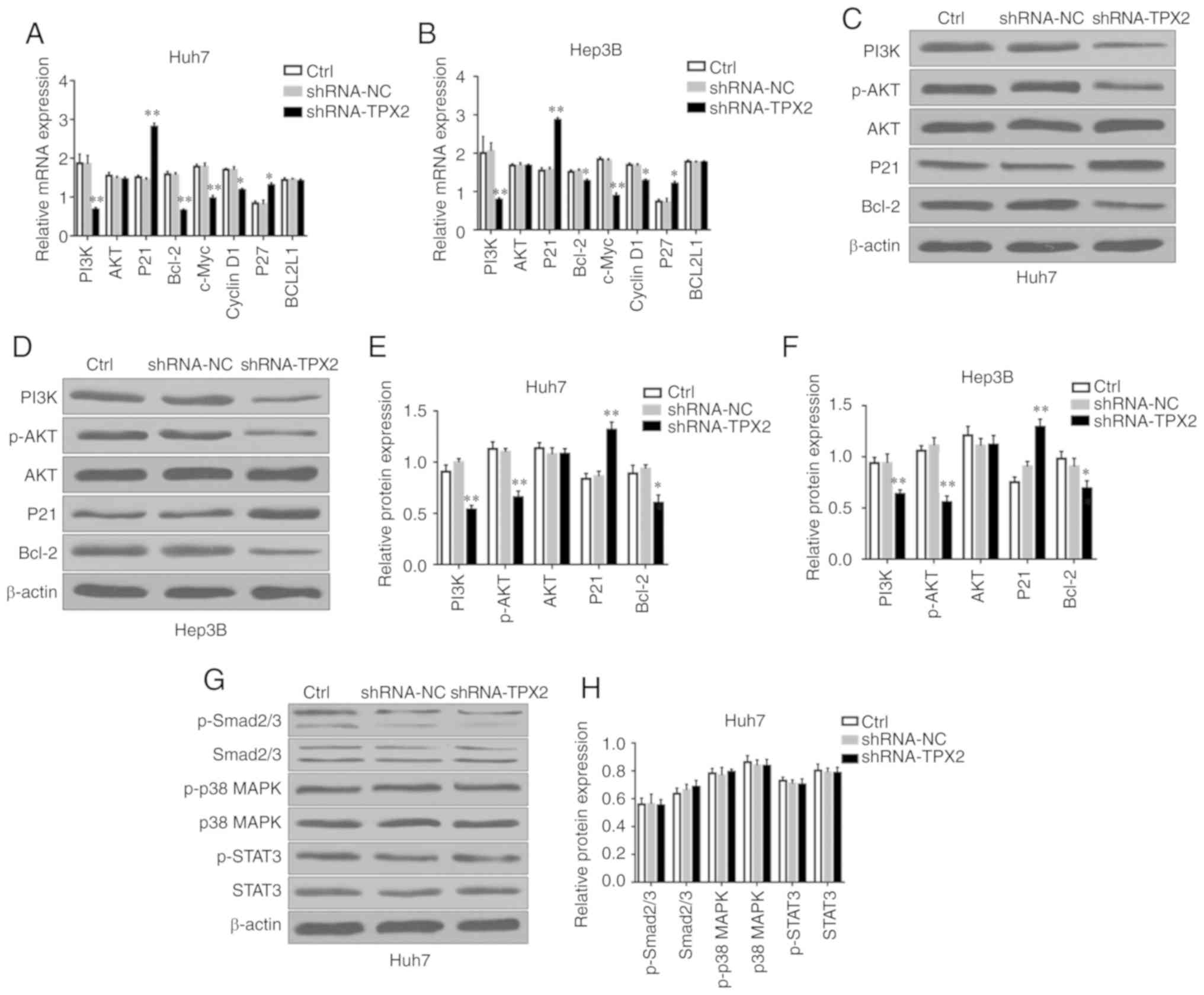|
1
|
Bray F, Ferlay J, Soerjomataram I, Siegel
RL, Torre LA and Jemal A: Global cancer statistics 2018: GLOBOCAN
estimates of incidence and mortality worldwide for 36 cancers in
185 countries. CA Cancer J Clin. 68:394–424. 2018. View Article : Google Scholar : PubMed/NCBI
|
|
2
|
Dandri M and Petersen J: Mechanism of
hepatitis B virus persistence in hepatocytes and its carcinogenic
potential. Clin Infect Dis. 62(Suppl 4): S281–S288. 2016.
View Article : Google Scholar : PubMed/NCBI
|
|
3
|
Wang M, Wang Y, Feng X, Wang R, Wang Y,
Zeng H, Qi J, Zhao H, Li N, Cai J and Qu C: Contribution of
hepatitis B virus and hepatitis C virus to liver cancer in China
north areas: Experience of the Chinese National Cancer Center. Int
J Infect Dis. 65:15–21. 2017. View Article : Google Scholar : PubMed/NCBI
|
|
4
|
de Martel C, Maucort-Boulch D, Plummer M
and Franceschi S: World-wide relative contribution of hepatitis B
and C viruses in hepatocellular carcinoma. Hepatology.
62:1190–1200. 2015. View Article : Google Scholar : PubMed/NCBI
|
|
5
|
Younossi ZM, Otgonsuren M, Henry L,
Venkatesan C, Mishra A, Erario M and Hunt S: Association of
nonalcoholic fatty liver disease (NAFLD) with hepatocellular
carcinoma (HCC) in the United States from 2004 to 2009. Hepatology.
62:1723–1730. 2015. View Article : Google Scholar : PubMed/NCBI
|
|
6
|
Liu Z, Jiang Y, Yuan H, Fang Q, Cai N, Suo
C, Jin L, Zhang T and Chen X: The trends in incidence of primary
liver cancer caused by specific etiologies: Results from the Global
Burden of Disease Study 2016 and implications for liver cancer
prevention. J Hepatol. 70:674–683. 2019. View Article : Google Scholar
|
|
7
|
Gruss OJ and Vernos I: The mechanism of
spindle assembly: Functions of Ran and its target TPX2. J Cell
Biol. 166:949–955. 2004. View Article : Google Scholar : PubMed/NCBI
|
|
8
|
Rennie YK, McIntyre PJ, Akindele T,
Bayliss R and Jamieson AG: A TPX2 proteomimetic has enhanced
affinity for Aurora-A due to hydrocarbon stapling of a Helix. ACS
Chem Biol. 11:3383–3390. 2016. View Article : Google Scholar : PubMed/NCBI
|
|
9
|
Pascreau G, Eckerdt F, Lewellyn AL,
Prigent C and Maller JL: Phosphorylation of p53 is regulated by
TPX2-Aurora A in xenopus oocytes. J Biol Chem. 284:5497–5505. 2009.
View Article : Google Scholar : PubMed/NCBI
|
|
10
|
Liu HC, Zhang Y, Wang XL, Qin WS, Liu YH,
Zhang L and Zhu CL: Upregulation of the TPX2 gene is associated
with enhanced tumor malignance of esophageal squamous cell
carcinoma. Biomed Pharmacother. 67:751–755. 2013. View Article : Google Scholar : PubMed/NCBI
|
|
11
|
Takahashi Y, Sheridan P, Niida A, Sawada
G, Uchi R, Mizuno H, Kurashige J, Sugimachi K, Sasaki S, Shimada Y,
et al: The AURKA/TPX2 axis drives colon tumorigenesis cooperatively
with MYC. Ann Oncol. 26:935–942. 2015. View Article : Google Scholar : PubMed/NCBI
|
|
12
|
Wei P, Zhang N, Xu Y, Li X, Shi D, Wang Y,
Li D and Cai S: TPX2 is a novel prognostic marker for the growth
and metastasis of colon cancer. J Transl Med. 11:3132013.
View Article : Google Scholar : PubMed/NCBI
|
|
13
|
Chen M, Zhang H, Zhang G, Zhong A, Ma Q,
Kai J, Tong Y, Xie S, Wang Y, Zheng H, et al: Targeting TPX2
suppresses proliferation and promotes apoptosis via repression of
the PI3k/AKT/P21 signaling pathway and activation of p53 pathway in
breast cancer. Biochem Biophys Res Commun. 507:74–82. 2018.
View Article : Google Scholar : PubMed/NCBI
|
|
14
|
Jiang P, Shen K, Wang X, Song H, Yue Y and
Liu T: TPX2 regulates tumor growth in human cervical carcinoma
cells. Mol Med Rep. 9:2347–2351. 2014. View Article : Google Scholar : PubMed/NCBI
|
|
15
|
Chang H, Wang J, Tian Y, Xu J, Gou X and
Cheng J: The TPX2 gene is a promising diagnostic and therapeutic
target for cervical cancer. Oncol Rep. 27:1353–1359.
2012.PubMed/NCBI
|
|
16
|
Tian Y, Liu LL, Guo DM, Wang Y, Zha WH, Li
Y and Wu FJ: TPX2 gene silencing inhibits cell proliferation and
promotes apoptosis through negative regulation of AKT signaling
pathway in ovarian cancer. J Cell Biochem. 119:7540–7555. 2018.
View Article : Google Scholar : PubMed/NCBI
|
|
17
|
Yan L, Li Q, Yang J and Qiao B:
TPX2-p53-GLIPR1 regulatory circuitry in cell proliferation,
invasion, and tumor growth of bladder cancer. J Cell Biochem.
119:1791–1803. 2018. View Article : Google Scholar
|
|
18
|
Yang X, Liu G, Xiao H, Yu F, Xiang X, Lu
Y, Li W, Liu X, Li S and Shi Y: TPX2 overexpression in medullary
thyroid carcinoma mediates TT cell proliferation. Pathol Oncol Res.
20:641–648. 2014. View Article : Google Scholar : PubMed/NCBI
|
|
19
|
Jian J, Huang Y, Liu LZ, Li SX and Deng F:
TPX2 gene-silencing inhibits the proliferation and invasion of
human colon cancer SW480 cells. TUMOR. 36:628–634. 2016.
|
|
20
|
Livak KJ and Schmittgen TD: Analysis of
relative gene expression data using real-time quantitative PCR and
the 2(-Delta Delta C(T) method. Methods. 25:402–408. 2001.
View Article : Google Scholar
|
|
21
|
Llovet JM, Bruix J, Fuster J, Castells A,
Garcia-Valdecasas JC, Grande L, Franca A, Brú C, Navasa M, Ayuso
MC, et al: Liver transplantation for small hepatocellular
carcinoma: The tumor-node-metastasis classification does not have
prognostic power. Hepatology. 27:1572–1577. 1998. View Article : Google Scholar : PubMed/NCBI
|
|
22
|
Xue S, Zhou Y, Zhang J, Xiang Z, Liu Y,
Miao T, Liu G, Liu B, Liu X, Shen L, et al: Anemoside B4 exerts
anti-cancer effect by inducing apoptosis and autophagy through
inhibiton of PI3K/Akt/mTOR pathway in hepatocellular carcinoma. Am
J Transl Res. 11:2580–2589. 2019.PubMed/NCBI
|
|
23
|
Feng PC, Ke XF, Kuang HL, Pan LL, Ye Q and
Wu JB: BMP2 secretion from hepatocellular carcinoma cell HepG2
enhances angiogenesis and tumor growth in endothelial cells via
activation of the MAPK/p38 signaling pathway. Stem Cell Res Ther.
10:2372019. View Article : Google Scholar : PubMed/NCBI
|
|
24
|
Li SJ, Sui MH, Sun ZX and Zhang WW: LncRNA
00152 promotes the development of hepatocellular carcinoma by
activating JAK2/STAT3 pathway. Eur Rev Med Pharmacol Sci.
23:1038–1046. 2019.PubMed/NCBI
|
|
25
|
Zuo J, Ma H, Cai H, Wu Y, Jiang W and Yu
L: An inhibitory role of NEK6 in TGFβ/Smad signaling pathway. BMB
Rep. 48:473–478. 2015. View Article : Google Scholar :
|
|
26
|
Yang Y, Yang X, Li L, Yang G, Ouyang X,
Xiang J, Zhang T and Min X: LASS2 inhibits proliferation and
induces apoptosis in HepG2 cells by affecting mitochondrial
dynamics, the cell cycle and the nuclear factor-κB pathways. Oncol
Rep. 41:3005–3014. 2019.PubMed/NCBI
|
|
27
|
Thelen A, Benckert C, Tautenhahn HM, Hau
HM, Bartels M, Linnemann J, Bertolini J, Moche M, Wittekind C and
Jonas S: Liver resection for hepatocellular carcinoma in patients
without cirrhosis. Br J Surg. 100:130–137. 2013. View Article : Google Scholar
|
|
28
|
Rhu J, Kim JM, Choi GS, Kwon CHD and Joh
JW: Continuing five or more locoregional therapies before living
donor salvage liver transplantation for hepatocellular carcinoma is
related to poor recurrence-free survival. Ann Surg Treat Res.
95:152–160. 2018. View Article : Google Scholar : PubMed/NCBI
|
|
29
|
Anderson TN and Zarrinpar A: Hepatocyte
transplantation: Past efforts, current technology, and future
expansion of therapeutic potential. J Surg Res. 226:48–55. 2018.
View Article : Google Scholar : PubMed/NCBI
|
|
30
|
Famularo S, Di Sandro S, Giani A, Lauterio
A, Sandini M, De Carlis R, Buscemi V, Uggeri F, Romano F, Gianotti
L and De Carlis L: Recurrence patterns after anatomic or
paren-chyma-sparing liver resection for hepatocarcinoma in a
western population of cirrhotic patients. Ann Surg Oncol.
25:3974–3981. 2018. View Article : Google Scholar : PubMed/NCBI
|
|
31
|
Meischl T, Rasoul-Rockenschaub S, Györi G,
Sieghart W, Reiberger T, Trauner M, Soliman T, Berlakovich G and
Pinter M: C-reactive protein is an independent predictor for
hepatocellular carcinoma recurrence after liver transplantation.
PLoS One. 14:e02166772019. View Article : Google Scholar : PubMed/NCBI
|
|
32
|
Scaggiante B, Kazemi M, Pozzato G, Dapas
B, Farra R, Grassi M, Zanconati F and Grassi G: Novel
hepatocellular carcinoma molecules with prognostic and therapeutic
potentials. World J Gastroenterol. 20:1268–1288. 2014. View Article : Google Scholar : PubMed/NCBI
|
|
33
|
Gao B, Li S, Tan Z, Ma L and Liu J: ACTG1
and TLR3 are biomarkers for alcohol-associated hepatocellular
carcinoma. Oncol Lett. 17:1714–1722. 2019.PubMed/NCBI
|
|
34
|
Augello G, Emma MR, Cusimano A, Azzolina
A, Mongiovì S, Puleio R, Cassata G, Gulino A, Belmonte B,
Gramignoli R, et al: Targeting HSP90 with the small molecule
inhibitor AUY922 (luminespib) as a treatment strategy against
hepatocellular carcinoma. Int J Cancer. 144:2613–2624. 2019.
View Article : Google Scholar
|
|
35
|
Pan W, Luo Q, Yan X, Yuan L, Yi H, Zhang
L, Li B, Zhang Y, Sun J, Qiu MZ and Yang DJ: A novel SMAC mimetic
APG-1387 exhibits dual antitumor effect on HBV-positive
hepatocellular carcinoma with high expression of cIAP2 by inducing
apoptosis and enhancing innate anti-tumor immunity. Biochem
Pharmacol. 154:127–135. 2018. View Article : Google Scholar : PubMed/NCBI
|
|
36
|
Neumayer G, Belzil C, Gruss OJ and Nguyen
MD: TPX2: Of spindle assembly, DNA damage response, and cancer.
Cell Mol Life Sci. 71:3027–3047. 2014. View Article : Google Scholar : PubMed/NCBI
|
|
37
|
Wittmann T, Wilm M, Karsenti E and Vernos
I: TPX2, A novel xenopus MAP involved in spindle pole organization.
J Cell Biol. 149:1405–1418. 2000. View Article : Google Scholar : PubMed/NCBI
|
|
38
|
Moss DK, Wilde A and Lane JD: Dynamic
release of nuclear RanGTP triggers TPX2-dependent microtubule
assembly during the apoptotic execution phase. J Cell Sci.
122:644–655. 2009. View Article : Google Scholar : PubMed/NCBI
|
|
39
|
Zhang H, Pan YZ, Cheung M, Cao M, Yu C,
Chen L, Zhan L, He ZW and Sun CY: LAMB3 mediates apoptotic,
proliferative, invasive, and metastatic behaviors in pancreatic
cancer by regulating the PI3K/Akt signaling pathway. Cell Death
Dis. 10:2302019. View Article : Google Scholar : PubMed/NCBI
|
|
40
|
Sun Y, Cao FL, Qu LL, Wang ZM and Liu XY:
MEG3 promotes liver cancer by activating PI3K/AKT pathway through
regulating AP1G1. Eur Rev Med Pharmacol Sci. 23:1459–1467.
2019.PubMed/NCBI
|
|
41
|
Cen D, Huang H, Yang L, Guo K and Zhang J:
Long noncoding RNA STXBP5-AS1 inhibits cell proliferation,
migration, and invasion through inhibiting the PI3K/AKT signaling
pathway in gastric cancer cells. Onco Targets Ther. 12:1929–1936.
2019. View Article : Google Scholar : PubMed/NCBI
|
|
42
|
Yun WK, Hu YM, Zhao CB, Yu DY and Tang JB:
HCP5 promotes colon cancer development by activating AP1G1 via
PI3K/AKT pathway. Eur Rev Med Pharmacol Sci. 23:2786–2793.
2019.PubMed/NCBI
|
|
43
|
Li H, Zhang Q, Wu Q, Cui Y, Zhu H, Fang M,
Zhou X, Sun Z and Yu J: Interleukin-22 secreted by
cancer-associated fibroblasts regulates the proliferation and
metastasis of lung cancer cells via the PI3K-Akt-mTOR signaling
pathway. Am J Transl Res. 11:4077–4088. 2019.PubMed/NCBI
|
|
44
|
Chen T, Gu C, Xue C, Yang T, Zhong Y, Liu
S, Nie Y and Yang H: LncRNA-uc002mbe.2 interacting with hnRNPA2B1
mediates AKT deactivation and p21 up-regulation induced by
trichostatin in liver cancer cells. Front Pharmacol. 8:6692017.
View Article : Google Scholar : PubMed/NCBI
|
|
45
|
Chen T, Huang H, Zhou Y, Geng L, Shen T,
Yin S, Zhou L and Zheng S: HJURP promotes hepatocellular carcinoma
proliferation by destabilizing p21 via the MAPK/ERK1/2 and
AKT/GSK3β signaling pathways. J Exp Clin Cancer Res. 37:1932018.
View Article : Google Scholar
|
|
46
|
Zhang Y, Liu Y, Duan J, Yan H, Zhang J,
Zhang H, Fan Q, Luo F, Yan G, Qiao K and Liu J: Hippocalcin-like 1
suppresses hepatocellular carcinoma progression by promoting
p21(Waf/Cip1) stabilization by activating the ERK1/2-MAPK pathway.
Hepatology. 63:880–897. 2016. View Article : Google Scholar
|
|
47
|
Ohkoshi S, Yano M and Matsuda Y: Oncogenic
role of p21 in hepatocarcinogenesis suggests a new treatment
strategy. World J Gastroenterol. 21:12150–12156. 2015. View Article : Google Scholar : PubMed/NCBI
|
|
48
|
Ma J, Ren Y, Zhang L, Kong X, Wang T, Shi
Y and Bu R: Knocking-down of CREPT prohibits the progression of
oral squamous cell carcinoma and suppresses cyclin D1 and c-Myc
expression. PLoS One. 12:e01743092017. View Article : Google Scholar : PubMed/NCBI
|
|
49
|
Chen Y, Fang L, Zhang J, Li G, Ma M, Li C,
Lyu J and Meng QH: Blockage of Glyoxalase I inhibits colorectal
tumorigenesis and tumor growth via upregulation of STAT1, p53, and
Bax and downregulation of c-Myc and Bcl-2. Int J Mol Sci.
18:2017.
|















